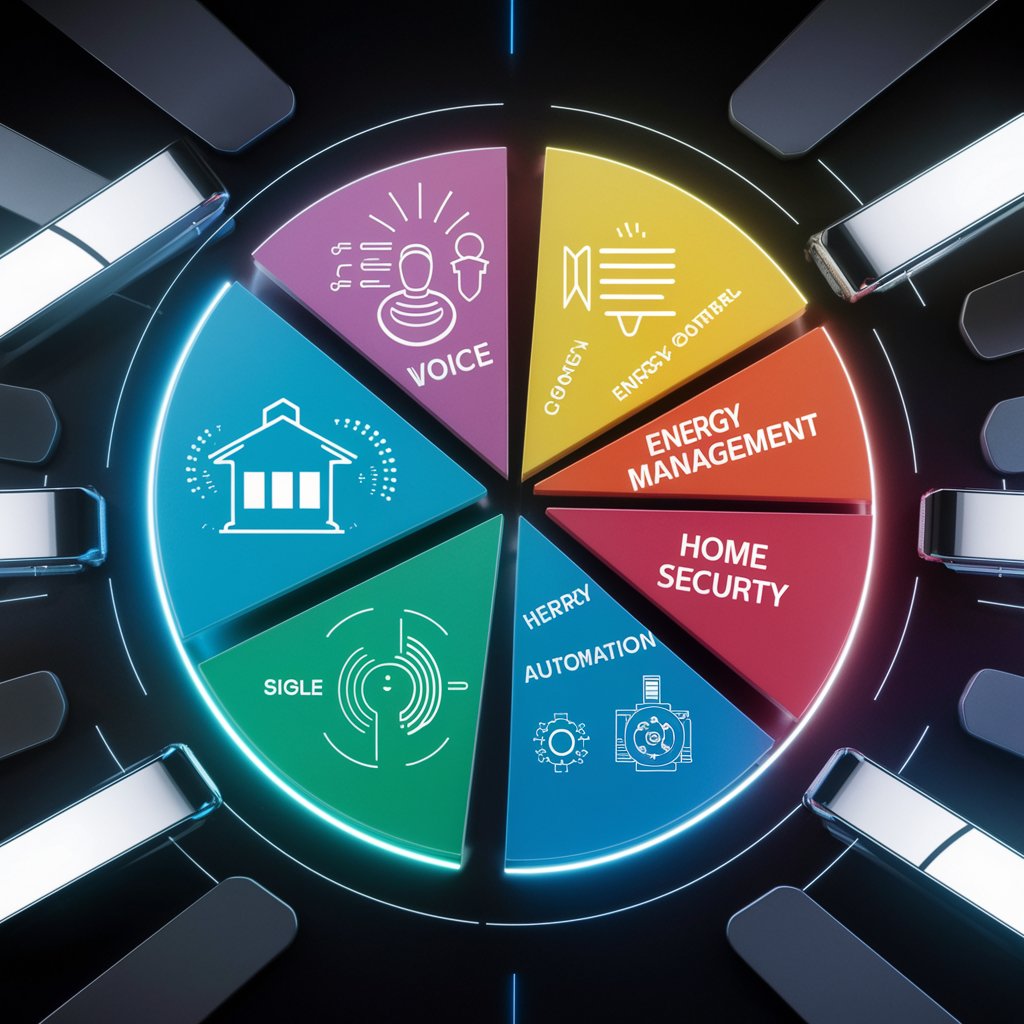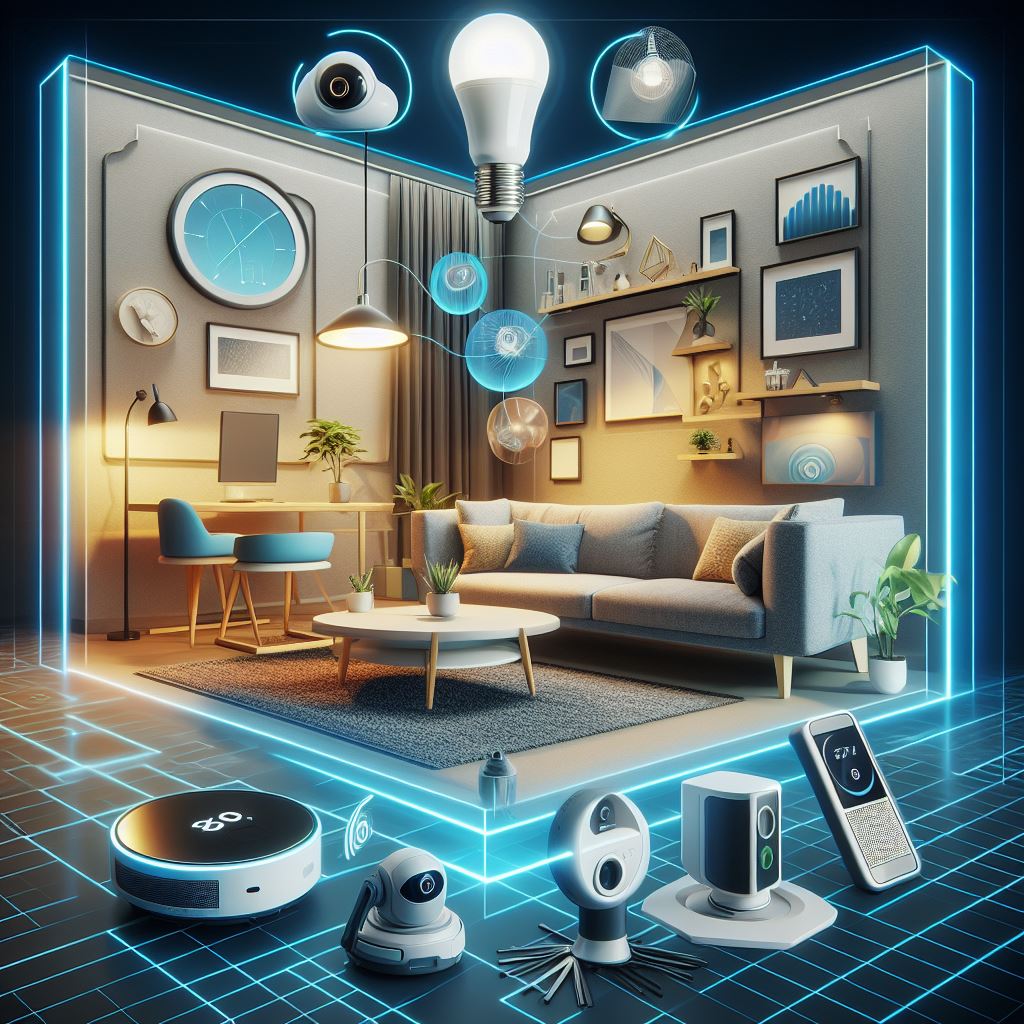As technology continues to advance at an unprecedented rate, the smart home has transitioned from a futuristic concept to a reality. From voice-controlled assistants to intelligent thermostats, today’s homes are becoming increasingly automated and interconnected. But this is just the beginning. The future of smart homes is poised to revolutionize how we live, interact with our spaces, and manage daily tasks. At the heart of this transformation are artificial intelligence (AI) and automation technologies, which are making homes more intuitive, energy-efficient, secure, and responsive to our needs.
Explore how AI and automation are shaping the future of smart homes, enhancing our living environments, and improving the way we experience home life.
What Is a Smart Home?
A smart home is a living space that uses internet-connected devices and automation to enhance the comfort, convenience, and security of its occupants. These devices communicate with each other through the Internet of Things (IoT), allowing for seamless interaction and control of various systems like lighting, heating, security, and appliances. Through the integration of AI, smart homes are becoming more adaptive, learning from user behavior and anticipating needs in real time.
The Role of AI in Smart Homes
Artificial intelligence plays a key role in the evolution of smart homes. AI algorithms analyze vast amounts of data to make homes more responsive and personalized. Here’s how AI is transforming living spaces:
1. Personalized Home Experiences
AI enables smart homes to learn from user behavior and preferences. For example, a smart thermostat powered by AI can learn when you prefer to be warm or cool, adjusting the temperature automatically to ensure optimal comfort. Similarly, AI-powered lighting systems can create the perfect ambiance by adjusting based on time of day, mood, or activity. Imagine your home greeting you with the perfect temperature, lighting, and music when you walk through the door, all based on what it knows about your preferences.
2. Voice-Controlled Automation
Voice assistants like Amazon Alexa, Google Assistant, and Apple Siri are already a core feature of smart homes, but the future promises even greater voice-enabled control. AI-driven voice assistants will become even more intuitive, allowing for natural, conversational commands. Whether it’s adjusting your thermostat, locking doors, or ordering groceries, you will be able to control nearly every aspect of your home with just your voice.
3. Predictive Maintenance
AI will also play a crucial role in predictive maintenance. Using sensors and machine learning algorithms, your smart home can track the health of appliances and systems like HVAC, refrigerators, and washing machines. If any of these systems begin to show signs of wear or malfunction, AI can predict potential failures before they happen, alerting homeowners and even scheduling repairs automatically. This proactive approach minimizes downtime and prolongs the lifespan of home appliances.
Download PDF Brochure @ https://www.marketsandmarkets.com/pdfdownloadNew.asp?id=121

4. Enhanced Security and Surveillance
AI-enhanced security systems are already beginning to redefine home protection. Cameras equipped with AI can distinguish between normal activity and potential security threats, sending alerts only when necessary. For instance, AI-powered security cameras can recognize family members and pets, filtering out false alarms triggered by things like a passing car or a neighbor’s dog. Additionally, smart doorbells with AI can provide facial recognition, allowing homeowners to see and interact with visitors remotely.
5. Home Automation for Energy Efficiency
One of the most promising aspects of AI in smart homes is its potential to create more energy-efficient living environments. AI can analyze data from various devices (e.g., lights, HVAC systems, and appliances) to identify patterns in energy use and adjust accordingly. For example, AI-powered systems can adjust the temperature based on whether the house is occupied, or smart lights can automatically dim or turn off when no one is in a room. These features not only make homes more comfortable but also help reduce energy consumption, making them more sustainable and cost-effective.
The Future of Smart Home Automation
As AI technology advances, smart home automation will continue to grow and become more integrated into our daily lives. Below are some key trends shaping the future of smart homes:
1. Increased Interoperability
As more devices enter the market, the ability for them to work seamlessly together will be crucial. Currently, many smart devices are compatible with specific ecosystems (e.g., Amazon Alexa, Google Home), but the future will see greater interoperability across platforms. This means homeowners will be able to mix and match devices from different manufacturers without worrying about compatibility issues. Expect to see unified platforms that allow for easier integration of various devices, making automation more accessible and intuitive.
2. AI-Driven Home Healthcare
AI will also revolutionize healthcare within the home. From smart wearables that track vital signs to automated medicine dispensers, smart homes will be able to monitor health data and alert homeowners or medical professionals if something is wrong. For instance, AI-powered health monitoring systems could track sleep patterns, heart rates, and other vital signs, offering recommendations for lifestyle improvements or detecting potential health issues early on.
3. Robotics and Smart Appliances
The rise of robots and smart appliances will transform how we manage household chores. Robotic vacuum cleaners and lawn mowers are just the beginning. In the future, we can expect robots capable of handling a wide variety of tasks, from cleaning and cooking to organizing and assisting with personal care. These robots will be powered by AI, enabling them to learn and adapt to household environments for more efficient performance.
4. AI-Enhanced Personalization
As AI becomes more sophisticated, smart homes will offer even greater levels of personalization. Through advanced machine learning algorithms, AI will understand the specific needs of each individual in the household. For example, AI could detect when you wake up or when your children return home from school, and automatically adjust the lights, start the coffee machine, or play music based on individual preferences.
5. Sustainability and Smart Homes
As the world increasingly focuses on sustainability, smart homes will become more energy-efficient and environmentally friendly. AI will be used to monitor and reduce energy consumption across the entire home. Solar panels, smart grids, and energy storage systems will work in unison to optimize energy use. Smart homes of the future will not only reduce carbon footprints but also help homeowners save money through energy savings.

Challenges and Considerations
Despite the many benefits, there are still challenges associated with the widespread adoption of smart home technologies:
- Privacy and Security: With more devices connected to the internet, there are concerns about the security of personal data and the vulnerability of home networks to hacking. Ensuring robust cybersecurity and privacy protections will be essential.
- Cost: Although the cost of smart devices is decreasing, the initial setup and integration of smart home technologies can still be expensive. Over time, however, the long-term benefits (such as energy savings) will likely outweigh the upfront costs.
- Compatibility: As new technologies emerge, ensuring compatibility across different brands and ecosystems will be key to creating seamless experiences.
The future of smart homes is bright, with AI and automation leading the charge toward smarter, more efficient, and personalized living spaces. These advancements will not only transform how we interact with our homes but also redefine what’s possible in terms of convenience, security, and sustainability. As AI-driven technologies continue to evolve, smart homes will become even more intuitive, connected, and capable of making our daily lives easier, safer, and more enjoyable. The future is here, and it’s smarter than ever.
Frequently Asked Questions (FAQ) –
1. What is a smart home?
A smart home uses internet-connected devices and automation to enhance the comfort, security, and energy efficiency of a living space. These devices communicate with each other, enabling homeowners to control lighting, heating, security systems, and appliances remotely, often via smartphone apps or voice commands.
2. How does AI play a role in smart homes?
Artificial Intelligence (AI) in smart homes allows devices to learn from users’ behavior, predict needs, and adjust the home environment accordingly. For instance, AI-powered thermostats learn your temperature preferences, lighting systems adjust automatically, and voice assistants can respond to commands naturally. AI makes these systems more responsive, personalized, and intelligent.
3. What are the benefits of smart homes with AI and automation?
- Increased convenience: You can control your home’s devices remotely or via voice commands.
- Energy efficiency: AI can optimize energy use, such as adjusting thermostats and lighting to save energy.
- Enhanced security: AI-driven surveillance cameras and smart locks enhance home safety by recognizing familiar faces or alerting homeowners of unusual activity.
- Personalized living experience: Smart systems adapt to your preferences, creating an environment tailored to your needs.
- Predictive maintenance: Smart devices can identify issues in appliances or home systems and alert homeowners before problems arise.
4. How can AI improve home security?
AI improves home security through smart surveillance cameras that can detect faces, motion, and unusual activities. For example, AI-powered cameras can distinguish between family members, pets, and strangers, sending alerts only when necessary. It can also integrate with smart locks and other systems to automatically lock doors or activate security features when needed.
5. What is the impact of smart homes on energy efficiency?
Smart homes equipped with AI can analyze energy consumption patterns and adjust systems like heating, lighting, and appliances to be more energy-efficient. AI-powered thermostats can learn when to heat or cool rooms based on occupancy, while lighting can turn off or dim when no one is in the room. These features help reduce electricity consumption, lower utility bills, and contribute to sustainability.
6. Are smart homes expensive to set up?
While the cost of smart home devices has decreased in recent years, setting up a fully integrated smart home can still be expensive, depending on the number and complexity of devices. However, the long-term savings from energy efficiency and improved appliance lifespan can offset initial costs.
7. How does AI enhance personalization in smart homes?
AI makes smart homes more personalized by learning individual preferences and routines. For instance, AI can detect when you wake up, adjust the lighting, play your favorite music, or set the perfect room temperature. Over time, AI-powered systems will get better at predicting your needs, improving the overall living experience.
8. What are the main challenges of smart homes with AI?
- Privacy concerns: With devices constantly collecting data, there is the potential for privacy issues, especially if these systems are hacked or misused.
- Compatibility: Many devices are made by different manufacturers, and ensuring they work together seamlessly can be challenging.
- Cybersecurity risks: As more devices are connected, homes become more vulnerable to cyberattacks if not properly secured.
- Cost: While prices are decreasing, some smart devices and full home automation systems may still be too expensive for some homeowners.
9. Will smart homes improve healthcare?
Yes! Smart homes can enhance healthcare through AI-driven devices that monitor health parameters. Smart wearables can track heart rate, sleep patterns, or glucose levels, and share this data with healthcare providers. Some smart systems might even offer reminders for medication or alert emergency services if a health issue is detected.
10. How will AI-driven automation in smart homes evolve?
In the future, AI-driven smart home technologies will continue to become more advanced and integrated. We will see:
- Greater interoperability between devices from different manufacturers.
- More intuitive systems that learn to anticipate and respond to household needs automatically.
- Robotic assistance for tasks like cleaning, cooking, and even healthcare.
- Sustainable solutions that focus on energy-efficient, eco-friendly technologies.
